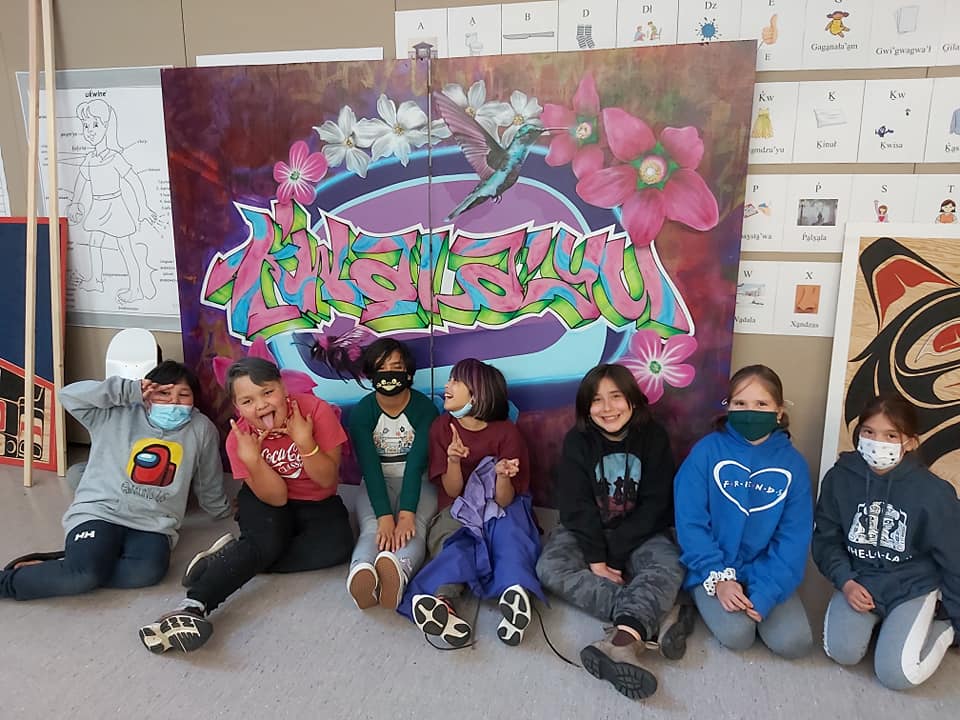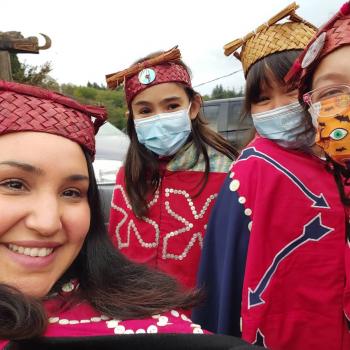Image Caption
Summary
Local Journalism Initiative Reporter
Windspeaker.com
Raven Barudin spends her days teaching and learning alongside her Grade 3/4/5 class at T'Lisalagi'lakw School at 'Na̱mg̱is First Nation in Alert Bay, BC.
Her curriculum includes exploring the land and plants of her home territory with her mostly Kwakwa̱ka̱'wakw class.
Barudin won the Prime Minister's Teaching Excellence Award, and she’s as humble as her family is proud.
She is 'Na̱mg̱is and Musg̱a̱'makw Dzawada̱'enux̱w through her mother, and carries the name Gwayabalagalis, passed from her mother.
Her school principal, Shane Douglas, nominated her for the award. Windspeaker.com asked Barudin if she thought the nomination stemmed from one special moment, or it was a combination of things that prompted Douglas.
“He could see not just me, but how my students were flourishing. We were learning from each other,” she said.
Barudin feels it's important for youth to know their Indigenous cultures.
“I’m drawing from our traditional ways of being, and also tie that to what my students are interested in," she says. "Tying that into the BC curriculum, (and) making connections. And then to branch out even farther, (to provide) a broader worldview, learn about other cultures, people and languages.”
Like many, Barudin didn't learn anything about residential school until she was in university.
“Being an elementary school teacher, now, with these (truth and reconciliation) calls to action, it's been really important to teach about this, with the right scope and sequence (and) what is appropriate at the different grade levels.”
Through Orange Shirt Day and “starting to have discussions about missing and murdered Indigenous women and girls, and protecting our water, it's really neat to be able to figure out when, and how you can spark that interest in action in them.”
Barudin grew up in the multicultural community of Burnaby, with parents who struggled financially and with addictions. Her father was a single parent raising two girls while on disability. A stroke had left him paralyzed.
“He was supportive, encouraging and made it clear that education was critical to success. Our mother did her best and was there when she could be. Her childhood trauma led her to struggling with alcoholism. Despite all of this, our family on both sides made it very clear that we were loved.”
“I didn’t have a chance to learn Kwak̓wala at school like my students do now,” she said. Alert Bay was always home to her, though. When she returned to her home territory to work at T'Lisalagi'lakw School, she also had her chance to learn Kwak̓wala from her fluent grandmother, Laura Cook.
“She’s been such a huge force in my life. She is a true matriarch and she’s supported so many of her children, grandchildren and great grandchildren in their educational endeavors.”
Part of coming home included caring for her mother during her last years with cancer. There came a moment after her mother’s passing when the healthiest thing for her grieving was to make a change. Barudin and her husband packed up their young daughter and his mother and left for teaching jobs in China. It’s an experience that grew them in new and different ways, including developing strong friendships and connections.
When Barudin became pregnant with their second daughter, it was time to return home. She felt a strong pull to bring her skillful, passionate teaching to her home community. COVID hit shortly after.
Barudin has spent the pandemic with a class of mostly Kwakwa̱ka̱'wakw children.
Language is incorporated in fun ways, like switching from English to Kwak̓wala in singing happy birthday songs. She teaches about medicinal and traditional foods in their nature walks. A memorable week was when the senior class (Grade 6/7) and some teaching staff went for a week-long cultural immersion camp with Nawalakw Healing Lodge.
“We had five Elders join us and we lived communally. It was such a powerful and healing experience for us all.” Sometimes a student will stop for a hug in the hallway and tell Barudin, ‘I miss living with you.’

In one special project, she invited her brother-in-law Vince Dumoulin to bring his artistry to do a graffiti project. Contemporary art merged with learning, and the expression of traditional values.
“The word we chose together was ḵ̓wa̱la’yu, meaning ‘my reason for living',” said Barudin of the core of the artwork.
There’s something special about working with youth in her own territory, she said. When they are out on the land, their feet are walking paths that all their relations have known for all time.
“Some of the important teachings that are shared at our school, especially by our cultural teachers Pewi Alfred and Eli Cranmer, that I remind my students of regularly is to hutłilala's (to listen), maya'xa̱lap̓a (to respect others, themselves, and the land, sea, and sky), łaxwalap̓a (to love one another).” It’s a special feeling.
Through the pandemic Barudin has her class outside twice a week, sometimes up to two hours at a time. It’s a territory of beautiful land and seascapes, and Barudin says she’s filled with gratitude for her life. She knew from a very young age that she wanted to be a teacher and work with children and youth.
“It was something that always came really naturally to me and, coming from an adverse background, I was really, really fortunate and grateful to have these wonderful mentors and teachers growing up. They guided me along on a good path.”
Barudin wanted to do the same and give back to her community. Her parents have passed now, but Barudin feels their pride. Her daughters will grow up knowing their mom is guided by ḵ̓wa̱la’yu—Many children are her reason for living.
Local Journalism Initiative Reporters are supported by a financial contribution made by the Government of Canada.

